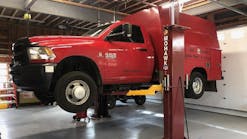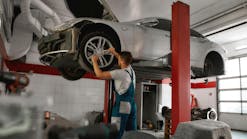Editor's note: This article has been updated from its original Sept. 2021 publication.
If your shop does not sell tires, then ask yourself, "why not?" You could be missing out on a lucrative opportunity. There are so many benefits to having tire sales as a profit center in your business.
Tires are not emphasized enough in most auto repair shops. Often, technicians overlook them on inspections, as well as sales advisors on your counter. Industry standard says that 25 percent of all the tires that come into your shop need to be replaced.
Think about how many cars your business handles in a week times four tires. Twenty-five percent of them should be recommended. Are you taking advantage of this? Do you know how many you recommended last week? Let's dive into the many other reasons to be in the tire business.
Increase sales and profits
Creating a new profit center in your business is a great way to affect profit. You may be thinking, "I really don't make that much on tires." On the rubber, the margin can be slim, especially if you have a lot of competition in the area. The real money is made on the tire packages and the gross profit earned per hour when installing tires.
Tiered labor for tire installs is a great way to get more bang for your buck instead of just a flat fee for all. We all know low profile, flotation sizes, and run-flats are not the same animal, so why would you charge the same? Tire protection is another part of the tire package. In-house tire protection usually goes for about 15 percent of the retail price of the tires. Statistics say that only six to eight percent of the tire protection money collected is actually used in a warranty.
Tire pressure monitors should also get replaced when installing tires which gains parts and labor profits, not to mention if you need to do a scanner or manual TPMS reset. Lastly, alignments are the second most profitable thing a shop can do behind balancing as far as gross profit as a percentage. You can also create alignment policies that can be sold as a one-year, three-year, five-year, or lifetime policy to earn more upfront and keep your customers coming back. You can also train an entry-level technician to perform all these services, increasing your margins even more.
Add value
There is no doubt tires can be a highly profitable segment of your business, but you're also providing another service to your community. The more services your shop can provide, the more valuable you are to your customers. You know they say, "time is money," right? So how do you think your customer would feel if they didn't have to go to another shop to buy tires, meet another service advisor, and take time out of their day? They wouldn't have to go to another shop for any warranty issues and things of that nature. Saving them time is added value.
When value exceeds price, price doesn't matter anymore. Wouldn't you want to add more value for your customers? I can assure you that dealerships and chain stores are highly trained in taking advantage of what other auto repair shops lack. Those repair shops have unlimited means to keep a customer returning to their shop. They will do vehicle walkarounds and get to know the customer.
They take notes on all customers to ensure they build a better relationship. They push in-store credit cards because they know if that customer has that card in their wallet, there is a good chance they will come back to them. They carry policy alignments they will tie to mileage warranties to ensure a few alignment visits a year.
They sell tire protection on almost all tire units, so they will also get rotation visits, and most of these facilities have strong follow-up processes to ensure they leave the customer happy after their visit. This is the last thing you want to happen. Don't let your customers get snagged by a guy like me just because you didn't think tires were worth it.
Optimize your time and opportunities
Another reason you should be in the tire business is because you're doing services every day that bring you less return. Let's use the oil change as an example. An oil change and courtesy check in most shops take about an hour. What do you get for the time? Not much, unless we find some other items to suggest. So why do we do it? We do it because most shop owners know that if they have the oil change visit, then they should have the rest. That makes sense and is true in most cases, but there isn't a lot of money in that hour of time.
With tires, the value is what can be produced in an hour's time and mix that with the fact they are constantly flowing through your shop. Every vehicle you see has four tires on it. This profit center is even more readily available for you than an oil change—tires are more consistently in your shop than oil changes. Having an auto repair shop and not being in the "tire business" would be like ignoring the fact that cars have brake pads. Have you ever sat back and wondered if brake repair is worth it?
All in all, it is clear to see the benefits of selling tires in your auto repair shop. I recommend that you start tracking your current tire recommendations. Ensure your team is doing thorough inspections of your tires on every car. As a coach, a good exercise I use with my members is to do a "walkaround" for every vehicle in the parking lot. Take note of the number of tires that should be recommended based on the tread. Then without saying anything to your technicians, see how many they recommend and compare the two. You might find that 25 percent to be a good marker for how focused your people are on selling tires. I find it's usually somewhere around 50 percent more are recommended by the sales staff than by the technicians. This exercise is a good place to start and can help get your tire profit center up and running.



